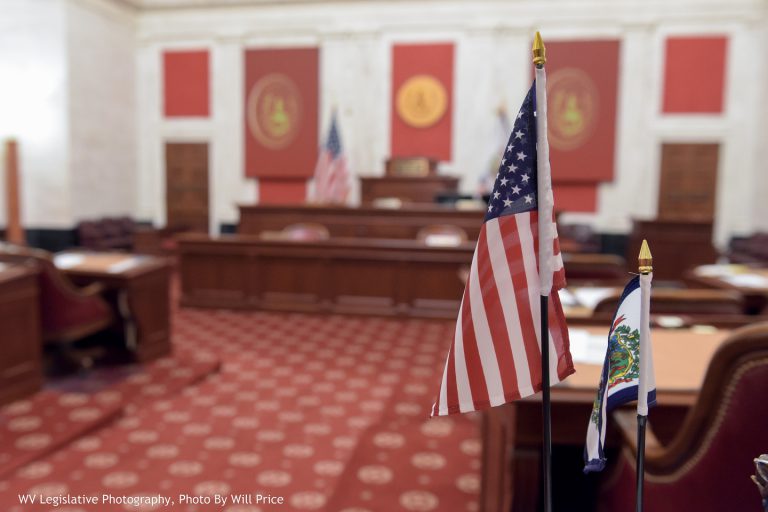As of 4 p.m., Wednesday, January 27, 2010, the 15th day of the 79th Legislature’s 2nd Regular Session, 367 bills have been introduced in the Senate.
Senate Bill 324 would establish a tax credit for graduates of higher education institutions for a portion of the interest paid on student loans. This is an incentive to attract and retain young talent to West Virginia.
Senate Bill 325 would provide services and facilities to assist student veterans at state institutions of higher education.
Senate Bill 326 would place hearings requested by a driver appealing the revocation of his or her license based on a DUI charge before the court that has jurisdiction over the original criminal DUI that caused the revocation of the license.
Senate Bill 327 would create an Office of Oral Health under the Bureau of Public Health, which would employ a full-time director with no less than three years of experience in health or management in a health care related setting. This will be created in hopes of improving existing and developing oral care in West Virginia.
Senate Bill 328 would allow a professional licensing board to post a proposed fee increase on its website and notify members of the website by mail or newsletter.
Senate Bill 330 would create the West Virginia Partnership to Promote Community and Well-Being Act and would be used to combat substance abuse.
Senate Bill 332 would fix technical aspects of the Emergency Medical Services Retirement System Act by alphabetizing terms, clarifying definitions and specifying procedures for the transfer of contributions from the Public Employees Retirement System while also modifying other aspects within the act.
Senate Bill 333 would clarify the authority of the West Virginia Consolidated Public Retirement Board to determine the participating employer contribution rate under the provisions of the Deputy Sheriff Retirement System. It would also remove the 10.5 percent cap on total employer contributions paid by the county commissions and concurrent employers.
Senate Bill 334 would require write-in candidates to pay a filing fee equal to 25 percent of what elected candidates normally pay. Previously, write-in candidates did not need to pay any filing fees.
Senate Bill 337 would require all of the money from the Racetrack Video Lottery Fund be used for paying off certain debt as well as paying off the workers compensation fund debt. The bill would also eliminate a $200,000 annual payment used for providing health and disability benefits to jockeys and their dependents.
Senate Bill 343 would require students to be seventeen before they are allowed to drop out of high school. It would also require schools to give a written notice to the parent after a child misses five days of schools.
Senate Bill 344 would allow certain organizations to create a special license plate. In order to qualify, organizations would have to be non-profit, apolitical, unaffiliated with a religious group, and not promoting a brand name. The qualifying organization would be able to put lettering or a logo on the plate. There would be an extra $25 fee for each plate, as well as an annual fee of $15.
Senate Bill 346 would create a statewide credentialing verification organization for health care practitioners. This would establish a regular schedule and remove the burden of practitioners having to get verified at random instances throughout the year.
Senate Bill 351 would require training for certain law enforcement officers to prevent racial profiling. The training would occur in new officer training and during annual in-service training.
Senate Bill 362 would punish people who give false information to medical practitioners in order to obtain a controlled substance with up to 9 months in jail and up to a $2,500 fine.
Senate Bill 366 would reduce the required number of members for a municipal planning commission in towns or villages to three. Currently, towns and village follow the same required amount as cities with a required five members.
Senate Bill 367 would make it a misdemeanor to use any technology found on a cellular device while driving. This includes text messaging, taking pictures and playing games. A first offense would be punishable by a fine of up to $100 and second and third offenses would be punishable by fines of up to $250 and $500 respectively.






 The Senate reconvened at 11 a.m. today and received messages concerning bills passed in the House.
The Senate reconvened at 11 a.m. today and received messages concerning bills passed in the House.  After reconvening at 11 a.m., the Senate introduced seven bills. These bills included
After reconvening at 11 a.m., the Senate introduced seven bills. These bills included  Outside of the Senate Chamber, Culture and History Day took place in the capitol rotunda. Many of the legislature’s talented constituents gathered to promote their respective organizations.
Outside of the Senate Chamber, Culture and History Day took place in the capitol rotunda. Many of the legislature’s talented constituents gathered to promote their respective organizations.  Entertainers of the Old Brick Playhouse dress in clown attire and travel to West Virginia’s elementary schools with educational messages. Today they performed an excerpt from their anti-drug show.
Entertainers of the Old Brick Playhouse dress in clown attire and travel to West Virginia’s elementary schools with educational messages. Today they performed an excerpt from their anti-drug show.
 The West Virginia Legislature celebrated West Virginia Fairs and Festivals Day in the capitol rotunda.
The West Virginia Legislature celebrated West Virginia Fairs and Festivals Day in the capitol rotunda.